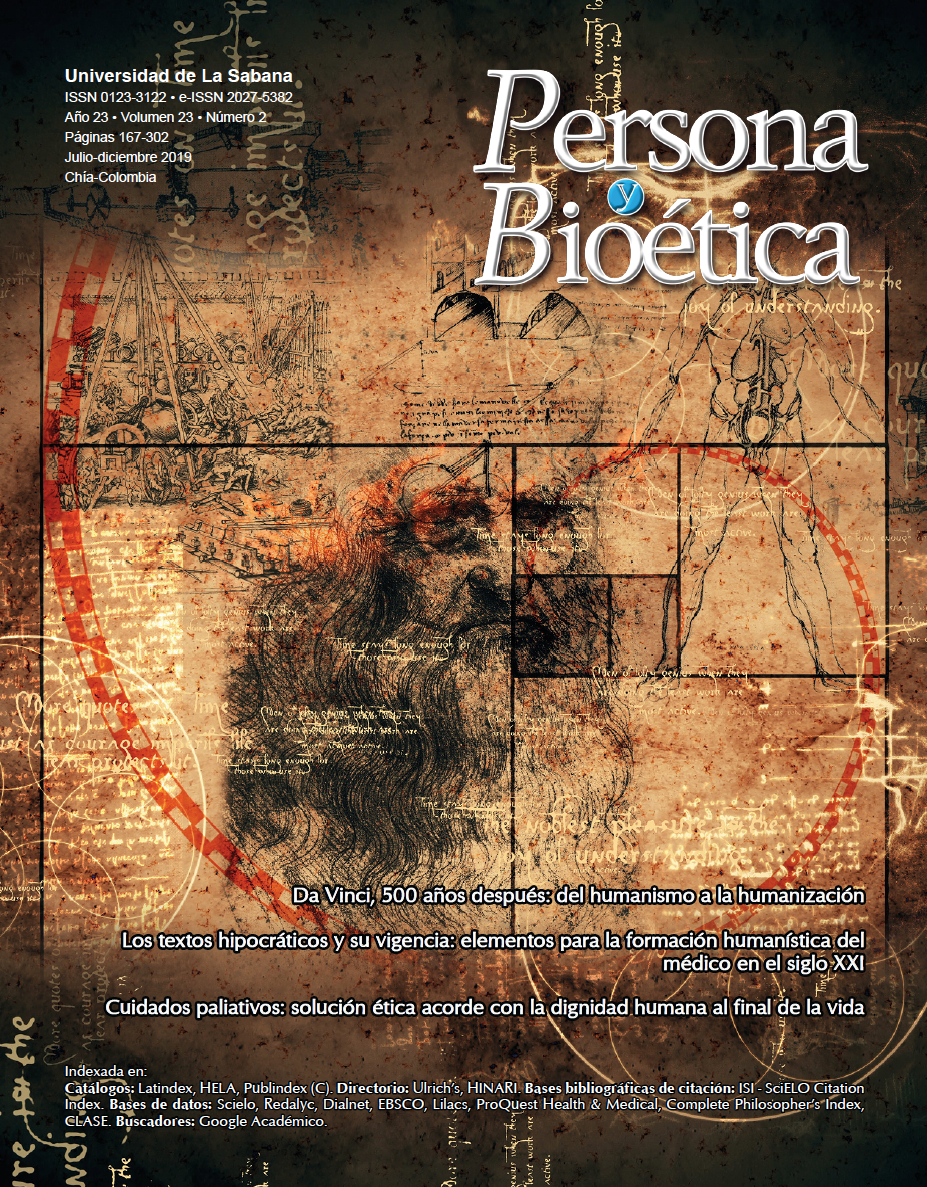Hippocratic Writings and their Relevance: Elements for the Humanistic Education of Doctors in the 21st Century
DOI:
https://doi.org/10.5294/pebi.2019.23.2.3Keywords:
Hippocratic medicine, bioethics, humanities, education, clinical practiceAbstract
Los textos hipocráticos y su vigencia: elementos para la formación humanística del médico en el siglo XXI
Os textos hipocráticos e sua validade: elementos para a formação humanística do médico no século XXI
By way of notes, comments are made on the validity of some Hippocratic works from the perspective of the learning and practice of medicine in the first decades of the 21st century, amidst a expanding technical-scientific and computer civilization. The paper highlights the affirmation of perennial truths —valid at all times— extracted from a selection of Hippocratic writings, which express the spirit of classic Greek medicine understood as tekhne iatrike. It was originally conceived as an activity of a rational, human, philanthropic and scientific nature aimed at serving the good of patients, following an ethos and some ethical principles and values of universal range, validity and application. It is proposed that taking in these concepts provides the medicine student with humanity, dignity, moral and intellectual growth, and improves their attitudes and aptitudes, skills and abilities to understand and face multiple existential situations that permeate daily clinical practice. This not only requires professional technical skills, but also humane attributes for better approaching interpersonal relationships with and attitudes towards the patient and their families. These ideas are introduced as a contribution of bioethics, characterized by its humanities-science-technology integration and educational mission of training critical consciences within the techno-scientific civilization, in order to foster respect for and openness towards diverse aspects of reality.
Para citar este artículo / To reference this article / Para citar este artigo
Gómez-Fajardo CA. Los textos hipocráticos y su vigencia: elementos para la formación humanística del médico en el siglo XXI. Pers Bioet. 2019;23(2):194-206. DOI: https://doi.org/10.5294/pebi.2019.23.2.3
Recibido: 20/04/2019
Aceptado: 18/07/2019
Downloads
References
Osler W. Aequanimitas con otros discursos. Filadelfia: The Blakiston Company; 1942.
Jaspers K. La práctica médica en la era tecnológica. Barcelona: Gedisa; 1988.
Pellegrino E. La experiencia vivida de la dignidad humana. En: Bochatey A. (comp.). Bioética y persona: Escuela de Elio Sgrecia. Buenos Aires: Educa; 2008. Pp. 327-335.
Córdoba-Palacio R. Orígenes de la medicina hipocrática. Medicina UPB. 1986;5(1):9- 16.
Córdoba-Palacio R. Ser médico. Misión del médico. Pers Bioét. 2015;19(1):142-48. DOI: https://doi.org/10.5294/pebi.2015.19.1.12
Toro-Mejía Á. Consideraciones acerca de las cualidades del buen médico y del profesionalismo en medicina. Acta Méd Col. 2011;36(1):45-50. Disponible en: http://www.scielo.org.co/pdf/amc/v36n1/v36n1a10.pdf
Toro-Mejía Á. Sir William Osler. Anales de la Academia de Medicina de Medellín. 1999;12(3):75-86.
Asher R. The seven sins of Medicine. The Lancet. 1949;254(6574):358-60. DOI: https://doi.org/10.1016/S0140-6736(49)90090-2
Arrizabalaga J. Historia de la medicina, una asignatura pendiente en la formación de los médicos. Investigación y Ciencia. 2016;10:14-5. Disponible en: https://www.investigacionyciencia.es/revistas/investigacion-y-ciencia/especial-40-aniversario-682/historia-de-la-medicina-una-asignatura-pendiente-en-la-formacin-de-los-mdicos-14548
Laín-Entralgo P. La medicina hipocrática. Madrid: Ed. Revista de Occidente; 1979.
Laín-Entralgo P. Historia de la Medicina. Barcelona: Salvat; 1978.
Jaeger W. Paideia. Bogotá: Fondo de Cultura Económica; 1992.
Sánchez-González MA. El humanismo y la enseñanza de las humanidades médicas. Educación Médica. 2017;18(3):212-8. DOI: https://doi.org/10.1016/j.edumed.2017.03.001
Córdoba-Palacio R. El juramento hipocrático, una ética para hoy. Pers Bioét. 2003;19:47-60. Disponible en: https://personaybioetica.unisabana.edu.co/index.php/personaybioetica/article/view/877
Córdoba-Palacio R. Bioética fundamental. Tomo I. Medellín: Editorial UPB; 1999.
Córdoba-Palacio R. Bioética fundamental. Tomo II. Medellín: Editorial UPB; 2001.
Zubiri X. ¿Qué es investigar? The Xavier Zubiri Review. 2005;7:5-7. Disponible en: http://biblio3.url.edu.gt/Libros/investigar.pdf
Tratados Hipocráticos. Madrid: Alianza Editorial; 1996.
Tratados Hipocráticos. Barcelona: Biblioteca Básica Gredos; 2001.
Sackett DL et al. Evidence based medicine: What is and what isn’t. BMJ 1996;12:71-2. DOI: https://doi.org/10.1136/bmj.312.7023.71
Castellanos-Olivares A, Vásquez-Márquez P. ¿Qué es la medicina basada en evidencias? Revista Mexicana de Anestesiología. 2016;39(1):s236-9. Disponible en: https://www.medigraphic.com/pdfs/rma/cma-2016/cmas161cc.pdf
Published
How to Cite
Issue
Section
License
Authors who publish with this journal agree to the following terms:
This journal and its papers are published with the Creative Commons License Attribution-NonCommercial-NoDerivatives 4.0 International (CC BY-NC-ND 4.0). You are free to share copy and redistribute the material in any medium or format if you: give appropriate credit, provide a link to the license, and indicate if changes were made; don’t use our material for commercial purposes; don’t remix, transform, or build upon the material.









